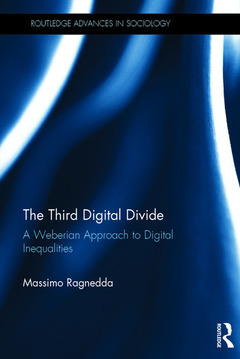The Third Digital Divide A Weberian Approach to Digital Inequalities Routledge Advances in Sociology Series
Auteur : Ragnedda Massimo

Drawing on the thought of Max Weber, in particular his theory of stratification, this book engages with the question of whether the digital divide simply extends traditional forms of inequality, or whether it also includes new forms of social exclusion, or perhaps manifests counter-trends that alleviate traditional inequalities whilst constituting new modalities of inequality. With attention to the manner in which social stratification in the digital age is reproduced and transformed online, the author develops an account of stratification as it exists in the digital sphere, advancing the position that, just as in the social sphere, inequalities in the online world go beyond the economic elements of inequality. As such, study of the digital divide should focus not simply on class dynamics or economic matters, but cultural aspects - such as status or prestige - and political aspects - such as group affiliations. Demonstrating the enduring relevance of Weber?s distinctions with regard to social inequality, The Third Digital Divide: A Weberian approach to rethinking digital inequalities explores the ways in which online activities and digital skills vary according to crucial sociological dimensions, explaining these in concrete terms in relation to the dynamics of social class, social status and power. As such, it will be of interest to social scientists with interests in sociological theory, the sociology of science and technology, and inequality and the digital divide.
List of figures
List of tables
Introduction
Chapter 1. The evolution of the digital divide
Chapter 2. Why does Weber still matter?
Chapter 3. Digital stratification: Class, status group and parties in the age of the Internet
Chapter 4. Life chances and the third level of digital divide
Chapter 5. Concluding remarks and recommendations
Index
Massimo Ragnedda (Ph.D), is a Senior Lecturer in Mass Communication at Northumbria University, Newcastle, where he conducts research on digital divide and social media. He has authored six books with some of publications appearing in peer-reviewed journals and book chapters in English, Spanish and Italian.
Date de parution : 02-2017
15.6x23.4 cm
Date de parution : 08-2018
15.6x23.4 cm
Thèmes de The Third Digital Divide :
Mots-clés :
Digital Inequalities; American Library Association; Digital Stratification; Digital Divide; Digital Capital; Van Deursen; Weberian Theoretical Framework; Digital Skills; Digital Realm; Weberian Lens; Offline Inequalities; ICT Penetration; Digital Sphere; Informal Peer Learning; Global Digital Divide; Contemporary Society; Offline Realm; Digitally Excluded; Digital Inclusion; Digital Arena; Van Dijk; Offline Patterns; Commerce’s National Telecommunications; Vice Versa; Max Weber’s Theory



